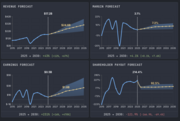
Best Financial Research Platforms 2026
What are Financial Research Platforms? Financial research platforms are software packages that assist in finding valuable information and insights in an ever-growing pandemonium of data. This type of information ranges from the common and easily accessible, such as the current yield on a 10-year Treasury note, to the obscure, like the average price-to-earnings of the consumer staples sector in Q2 2001, and much more. This data may be dispersed across multiple sources, including government ...
We’ve collected videos, features, and capabilities below. Take me there.
All Products
Learn More about Financial Research Software
What are Financial Research Platforms?
Financial research platforms are software packages that assist in finding valuable information and insights in an ever-growing pandemonium of data. This type of information ranges from the common and easily accessible, such as the current yield on a 10-year Treasury note, to the obscure, like the average price-to-earnings of the consumer staples sector in Q2 2001, and much more. This data may be dispersed across multiple sources, including government databases, company records, exchange data, etc. Several pieces of information located in different databases or sources may need to be aggregated to get useful information. Financial research platforms help solve these problems by centralizing this data and providing tools to search and analyze it.
This centralization increases research speed and efficiency and the likelihood of finding winning strategies or insightful ideas. To the end of finding information, most platforms have basic search tools while some have smart search tools. Basic search tools act much like a search in a word processor, searching for exact or partial matches across a variety of documents and databases. Intelligent search tools use various search technologies and data-extraction technologies to help find information related to the query or data in non-standard formats. The platforms may also contain a variety of analytical tools to either replace or augment analyses from external programs.
A feature of note available in Finanical Research platforms is ESG Reporting and Analysis. Financial research platforms have evolved into indispensable tools for businesses aiming to enhance their ESG (Environmental, Social, and Governance) reporting and analysis. These platforms offer a diverse range of functionalities that can be tailored to meet individual business needs. One significant advantage lies in the access to a wealth of ESG data and insights on companies, covering areas such as environmental impact, social practices, and governance structure. Leveraging this data empowers businesses to make informed decisions, identify risks and opportunities, and align their operations with sustainable practices.
Moreover, these platforms often include ESG scoring and benchmarking capabilities, enabling businesses to assess their performance relative to industry peers and best practices. Streamlining ESG reporting and disclosure processes is another key feature, with tools providing templates aligned with industry standards and regulations. This functionality enhances transparency, ensures compliance, and facilitates effective communication of ESG efforts to stakeholders. Advanced ESG research and analysis tools, including AI-powered search and natural language processing, contribute to in-depth exploration of ESG-related news, reports, and documents, providing valuable insights for shaping ESG strategies.
Furthermore, financial research platforms seamlessly integrate ESG reporting and analysis functionalities into existing investment research workflows. This integration allows businesses to holistically evaluate investment opportunities by accessing ESG data alongside traditional financial data, ultimately mitigating risks, complying with regulations, and optimizing returns for clients.
Analysts and managers in investment firms, banks, hedge funds, and mutual funds are the predominant users of financial research platforms. If multiple analysts or managers use a platform as part of a team, the ability to share and distribute analyses may be an important functionality.
While financial research platforms provide data for making trading and investment decisions, it is still necessary to have a way to execute trades. Some financial research platforms, especially those aimed at larger institutions, will have the functionality to place and execute trades across various asset classes. Other platforms will not have this functionality, and a third-party online trading system will be necessary.
Financial Research Features
Most products in the Financial Research category have the following features:
- Company fundamentals data
- Industry and sector-level data
- Company regulatory filing access
- Independent analysis reports
- Private company data
- Global firm data
- Mergers and acquisitions analysis
- Supply chain data
- Company credit ratings
- Environmental, Social, and Governance (ESG) data
- Asset filters and screeners
- Financial news sources
- Real-time alerts
- Intelligent search functions
- Customizable analysis tools
- Mobile platforms
Financial Research Platforms Comparison
Data Sources: The heart of every financial research platform is the data it provides. While some firms may have proprietary data, much will be sourced from publicly available records and third-party sources. Investigate the databases and other sources of information to ensure you are getting the data you need and that it is accurate.
Asset Classes: Not every financial research platform covers every asset class. Some may specialize in providing public and private corporate fundamentals and regulatory filings, while others may focus exclusively on mutual and hedge fund performance. Make sure that your platform of choice covers the asset classes that you currently utilize or may utilize in the future.
News Source and Speed: A significant edge can come from getting newly announced information or breaking stories first. For that, you need accurate and fast news. Check what, if any, news sources are associated with your platform of choice. In particular, check how soon they provide critical information and how often they break key stories.
Collaborative Tools: If your organization has a team of analysts, then they may want to share analyses and ideas. Some financial research platforms have the built-in ability to share their work. Others may require the sending of files through a third party, and some may just not provide this functionality. Depending on the amount of collaboration within a team, built-in collaboration functionality can save a significant amount of time.
Start a Financial Research Platforms comparison here
Pricing Information
There is significant variation in the price for financial research platforms. Platforms targeted at individuals and small investment firms or with a narrower asset focus may provide some free services and cost around $50 per month per account. In contrast, platforms targeted at larger institutional investors can cost tens of thousands of dollars per user every year. Some vendors will offer free trials with limited features. Many vendors do not have set pricing, instead offering custom quotes.
























